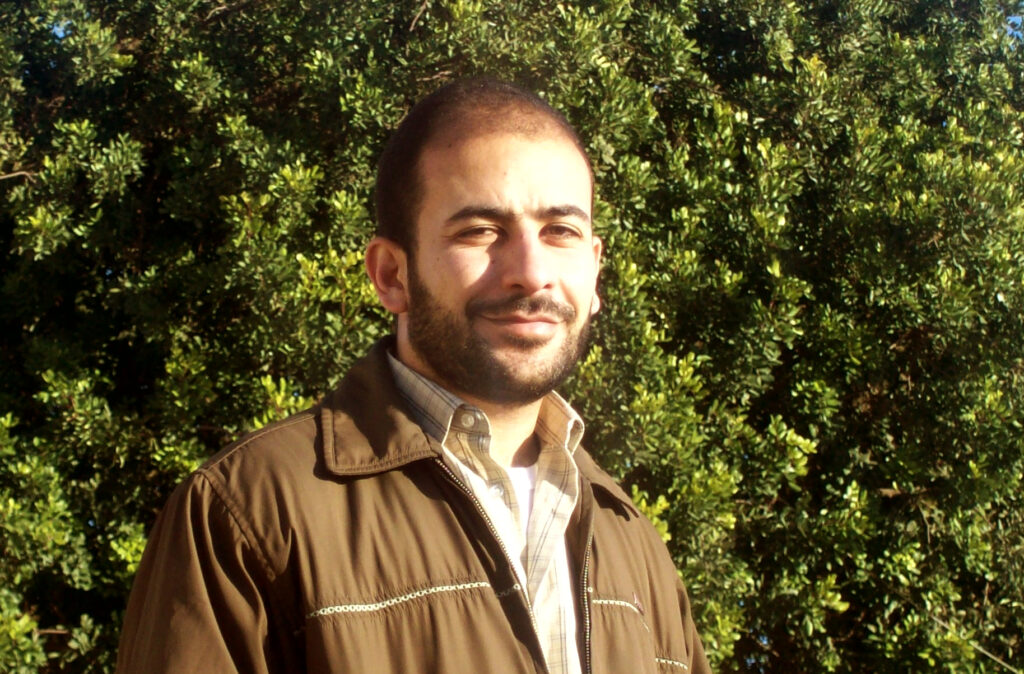
Palestinian prisoner and former long-term hunger striker Ayman al-Tabeesh is once again on hunger strike; 13 April marks his ninth day without food in protest of his ongoing isolation. Al-Tabeesh, 37, from the village of Dura near al-Khalil, is currently imprisoned without charge or trial under administrative detention. He is held in isolation from other prisoners in Ramon prison and denied family visits, and he has launched his strike against his solitary confinement. He is also participating along with the 450 other administrative detainees in the collective boycott of Israeli occupation courts that has been ongoing for 58 days.
Al-Tabeesh’s mother spoke with Asra Voice radio, saying that she had no means of communication with her son and that they have been denied the right to visit Ayman consistently. She noted that her son had previously conducted a hunger strike for more than 100 days to win his release from administrative detention without charge or trial. He has spent over 15 years in prison and has been held under administrative detention with repeated renewals on multiple occasions. Most recently he has been imprisoned since 2 August 2016 and his administrative detention has been renewed four times. He has been refused permission for family visits since his arrest.
In addition, his brother Khaled al-Tabeesh is also imprisoned since 27 July 2017. While their mother had been denied a permit to visit him since that time, she was approved for a visit only a few days ago. However, on 11 April, her visit permit to see Khaled was suddenly and arbitrarily withdrawn.
Fellow Palestinian prisoner and former long-term hunger striker Khader Adnan also issued a statement from Israeli prison, saying that his fellow prisoners will not leave Ayman al-Tabeesh alone in isolation. He also noted that there are more prisoners held captive in solitary confinement by Israeli occupation forces, some for years at a time.
Al-Tabeesh is not the only Palestinian prisoner on hunger strike; Musab al-Hindi, 28, from al-Tal village near Nablus, has been on hunger strike for 31 days. He has been transferred several times in an attempt to physically and psychologically pressure him to break his strike, most recently being moved to isolation in Eshel prison. Al-Hindi has been imprisoned since 15 March 2017 without charge or trial under administrative detention. He launched his strike upon the news of the renewal of his imprisonment for yet another six-month period. Since he launched his strike, he has been held in isolation, denied family visits and banned from accessing the “canteen” (prison store) even for non-food items for two months.
Also on hunger strike is fellow administrative detainee and long-term hunger striker Sami Janazrah, 45; Saleh Abu Sawawin, from Khan Younis in Gaza, protesting his imprisonment for the past two months after being abducted while protesting on the Gaza “border;” Adel Shehadeh, from Nablus, on hunger strike for 26 days against torture and mistreatment under interrogation in Jalameh; Amir Sarkaji, 21, on hunger strike against his torture and mistreatment under interrogation at Petah Tikva; Wissam Rabie, on hunger strike since 11 April against his interrogation and sleep deprivation in Moskobiyeh detention center; Amir Assad, on strike against medical neglect and mistreatment; and Bashir al-Khatib, 56, on strike for 29 days against the ongoing denial of necessary medical and dental care. Fahd Hureiyah, 29, from Balata refugee camp, who was re-arrested after being released in the 2011 Wafa al-Ahrar prisoner exchange, also launched an open hunger strike two days ago to protest a lack of medical care in Israeli prisons.
Janazrah’s body is reportedly already showing serious signs of health deterioration, said his lawyer after visiting him in Ofer prison on 12 April. He previously held a hunger strike for 70 days to win his freedom from administration; he was re-arrested on 12 December 2017 and launched his strike with the renewal of his detention.

Many of these strikers, including al-Tabeesh, Janazrah and al-Hindi, are also participating in the collective protest of the administrative detainees, which has continued for 58 days, involving comprehensive boycott of the occupation courts by all of the over 450 administrative detainees out of 6,500 total Palestinian prisoners in Israeli jails, from all Palestinian political parties and factions.
The administrative detainees had previously announced a planned escalation in their campaign, including launching a successive hunger strike on 15 April and beginning the boycott of prison clinics on 12 April. However, after a meeting between the representative committee of the administrative detainees and Israeli representatives in the prison system, they announced that these escalation steps would be suspended while the boycott of the courts continues. The meeting agreed to hold an expanded meeting with Israeli officials from the prison service, army and intelligence agency and review the file of administrative detention. The prisoners’ committee said that if the decisions of the meeting are not moved forward seriously, the escalation steps will be resumed.
Discover more from Samidoun: Palestinian Prisoner Solidarity Network
Subscribe to get the latest posts sent to your email.




